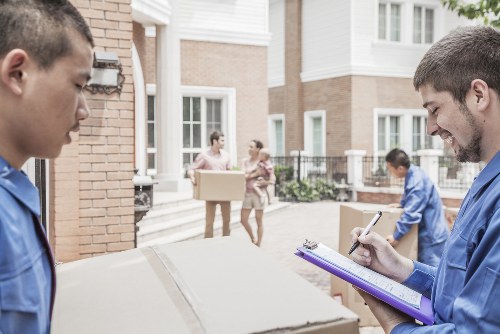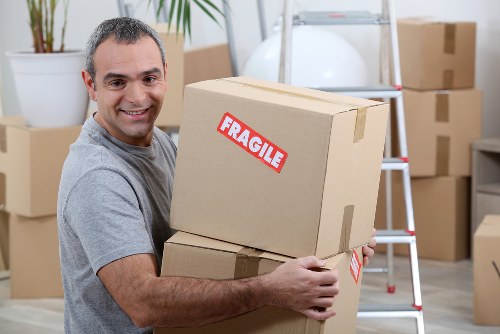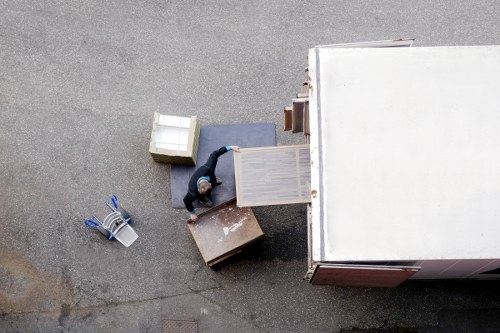Comprehensive Guide to Waste Disposal in East London

Waste disposal is a critical aspect of maintaining a clean and healthy environment in East London. With the increasing population and industrial activities, managing waste efficiently has become more important than ever.
East London faces unique challenges when it comes to waste management, including limited space for waste facilities and the need for sustainable disposal methods. Understanding the various options available can help residents and businesses make informed decisions.
In this article, we will explore the different waste disposal methods in East London, the regulations governing waste management, and tips for reducing waste in your daily life.
Understanding Waste Disposal

Waste disposal involves the collection, transportation, and disposal of waste materials. Proper waste management is essential to prevent pollution, protect public health, and conserve natural resources.
There are several types of waste, including household waste, commercial waste, industrial waste, and hazardous waste. Each type requires specific handling and disposal methods to minimize environmental impact.
In East London, waste disposal is managed by both public and private companies, ensuring that waste is handled responsibly and in compliance with local regulations.
Types of Waste Disposal Methods

There are various methods of waste disposal, each with its advantages and disadvantages. The most common methods include:
- Landfilling: The process of burying waste in designated landfill sites. It is cost-effective but can lead to environmental issues if not managed properly.
- Recycling: Converting waste materials into reusable materials. This reduces the need for new raw materials and minimizes landfill use.
- Incineration: Burning waste at high temperatures. It reduces the volume of waste but can produce harmful emissions if not controlled.
- Composting: Decomposing organic waste into fertilizer. This is an environmentally friendly method suitable for biodegradable waste.
Choosing the right disposal method depends on the type of waste, available facilities, and environmental considerations.
Regulations and Policies in East London

Waste management in East London is governed by a set of regulations and policies aimed at ensuring responsible disposal and minimizing environmental impact.
The local council has implemented strict guidelines for waste segregation, recycling targets, and penalties for illegal dumping. Additionally, businesses are required to follow specific protocols for disposing of industrial and hazardous waste.
Staying informed about these regulations helps residents and businesses comply with the law and contribute to a cleaner environment.
Recycling Initiatives

Recycling plays a vital role in East London's waste management strategy. Numerous initiatives have been launched to encourage residents to recycle more effectively.
These initiatives include providing separate bins for different types of recyclables, organizing community recycling drives, and offering incentives for households and businesses that achieve high recycling rates.
By participating in these programs, individuals can significantly reduce the amount of waste sent to landfills and support sustainable practices in the community.
Tips for Reducing Waste
Reducing waste is essential for sustainable living. Here are some practical tips to help you minimize your waste footprint:
- Reduce Single-Use Items: Opt for reusable bags, bottles, and containers instead of single-use plastics.
- Compost Organic Waste: Turn kitchen scraps and garden waste into compost for your plants.
- Buy in Bulk: Purchase items in bulk to decrease packaging waste.
- Repair Instead of Replace: Fix broken items instead of throwing them away and buying new ones.
- Donate Unused Items: Give away items you no longer need to reduce waste and help others.
Local Facilities and Services
East London is equipped with various facilities and services to manage waste effectively. These include recycling centers, waste collection services, and hazardous waste disposal sites.
Residents can access these services through the local council's website, which provides information on collection schedules, accepted materials, and locations of recycling centers.
Using these facilities ensures that waste is disposed of correctly and contributes to the overall cleanliness of the area.
Community Involvement
Community involvement is crucial for successful waste management. Local groups and organizations often organize clean-up events, educational workshops, and recycling drives to promote responsible waste disposal.
By participating in these activities, individuals can help maintain a cleaner environment and foster a sense of community responsibility towards waste management.
Additionally, raising awareness about the importance of reducing, reusing, and recycling can lead to more sustainable practices within the community.
Innovative Waste Management Solutions
East London is exploring innovative waste management solutions to address the growing waste problem. These include:
- Advanced Recycling Technologies: Implementing technologies that improve the efficiency and effectiveness of recycling processes.
- Waste-to-Energy Plants: Converting waste into energy through incineration or other methods, reducing landfill use and generating power.
- Circular Economy Models: Promoting systems where products are designed for reuse, repair, and recycling, minimizing waste generation.
- Smart Waste Management Systems: Utilizing sensors and data analytics to optimize waste collection routes and reduce operational costs.
Challenges in Waste Disposal
Despite the efforts made, East London faces several challenges in waste disposal, such as:
- Limited Space for Landfills: Finding new locations for landfills is difficult due to urbanization and environmental concerns.
- Contamination in Recyclables: Improper sorting of recyclables leads to contamination, reducing the efficiency of recycling processes.
- Public Awareness: Lack of awareness and participation from the public can hinder waste reduction efforts.
- Cost of Waste Management: High costs associated with waste collection, transportation, and disposal can strain local budgets.
Future of Waste Disposal in East London
The future of waste disposal in East London looks promising, with ongoing initiatives aimed at enhancing sustainability and efficiency.
Investments in green technologies, increased emphasis on recycling and composting, and stronger community engagement are expected to drive positive changes in waste management practices.
By continuing to innovate and collaborate, East London can achieve its waste disposal goals and set an example for other regions.
Conclusion
Effective waste disposal in East London is essential for maintaining a clean and healthy environment. By understanding the available waste management options, adhering to regulations, and actively participating in recycling initiatives, residents and businesses can contribute to a sustainable future.
Embracing innovative solutions and overcoming challenges will further enhance waste disposal practices, ensuring that East London remains a vibrant and eco-friendly community.
Nearby Areas to East London
East London is surrounded by several vibrant areas, each contributing uniquely to the region's waste management landscape. Here are some of the closest areas:
- Stratford: Known for its Olympic Park and extensive recycling facilities.
- Newham: Home to numerous waste collection centers and environmental initiatives.
- Barking and Dagenham Offers comprehensive waste disposal services and community recycling programs.
- Waltham Forest: Features innovative waste management projects and green spaces.
- Redbridge: Utilizes advanced recycling technologies and promotes sustainable living.
- Havering: Provides efficient waste collection services and supports local recycling efforts.
- Tower Hamlets: Implements smart waste management systems and environmental campaigns.
- Hackney: Engages in community-driven waste reduction and recycling initiatives.
- Hounslow: Offers diverse waste disposal options and promotes eco-friendly practices.
- Greenwich: Focuses on sustainable waste management and educational programs.
- Lewisham: Supports comprehensive recycling programs and waste reduction strategies.
- Bexley: Provides robust waste collection services and environmental awareness campaigns.
- Bromley: Engages in innovative waste management solutions and community involvement.
- Hillingdon: Utilizes efficient waste disposal methods and promotes recycling initiatives.
- Enfield: Focuses on sustainable waste practices and comprehensive recycling services.
Frequently Asked Questions
1. How can I dispose of hazardous waste in East London?
Hazardous waste should be disposed of at designated collection centers. You can find information on locations and schedules on the local council's website.
2. What items can I recycle in East London?
Common recyclable items include paper, cardboard, glass bottles, metal cans, and certain plastics. It's important to check local guidelines for specific materials.
3. Are there any fees for waste collection services?
Waste collection services may have associated fees depending on the type and volume of waste. Check with your local council for detailed pricing information.
4. How can businesses participate in waste reduction programs?
Businesses can participate by implementing recycling programs, reducing single-use items, and collaborating with waste management services to ensure proper disposal of industrial waste.
5. What are the benefits of composting at home?
Composting reduces the amount of organic waste sent to landfills, enriches soil, and lowers greenhouse gas emissions, contributing to a healthier environment.